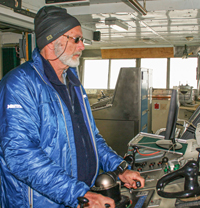News / Interview

|
Dallas Murphy has conducted annual science-writing workshops at several Max Planck Institutes for the last decade, working on hundreds of grad-student papers. These works often lack
structure and are thick with verbiage and long sentences, instead of clearly expressing their
main scientific ideas. Thus, writing techniques and structured communication are important
issues to address. However, they are not the first thing to consider. A clear understanding of
the content must precede thinking about structuring the expression of the content. |
Interview with Dallas Murphy: “Only science matters”
In his seminar “The Scientific Essence,” Dallas Murphy will discuss how to formulate the first step in the composition of a science paper. His seminar is part of our Professional Skill Series starting in October 2020.
I understand you’re a professional writer. Please tell us about your work.
I began writing full time shortly after graduate school. Two of my plays have been produced in New York, where I live, and in San Francisco. I’ve published eight books, a mix of fiction and nonfiction, the latter about the ocean and ocean science. I’ve been an ocean-obsessive since childhood. I’ve participated in about twelve month-long oceanographic expeditions, mostly in the Arctic, where my job was to write daily essays about the science, life aboard research vessels, and the means by which scientists measure oceans. My book To the Denmark Strait is about a particularly significant 2011 expedition in Iceland/Greenland waters.
You’ve also been conducting science-writing workshops at Max Planck Institutes and elsewhere. How did that come about?
In 2005, I met Jochem Marotzke, Director of MPI for Meteorology, aboard a NOAA research ship and one evening chatting on the fantail, Jochem said, “My grad students have trouble writing science papers. What can we do about that?” From there, the annual workshops have expanded to MPI for Polymer Research, Bergen (Norway) Geophysical Institute, University of Hamburg, and University of Miami’s marine and atmospheric school. I’ve worked on about 400 grad-student papers over the years.
What have you learned about their writing problems?
The problems are remarkably similar, no matter the scientific discipline or the writers’ native language. First, is a lack of understanding of their own science, what’s new about it, what knowledge gap it fills, why it matters to the field—in other words, the content of the papers. Second, how to organize the content into a tight, clear literary structure. I have the utmost empathy for new writers and their struggles, with no previous writing experience, to produce publishable papers.
Generally speaking, what is the essence of a good science paper?
Clarity. Only the science matters, and so the science writer’s sole stylistic obligation is to be clear. In other words, let the writing stay out of the way of the science. This of course is easier said than done.
How is that accomplished?
By remembering that there is only one reason to write or to read a science paper—the communication of new science to fellow scientists in your discipline. What’s new determines the structure and focus of the paper, what Germans call the “red thread.” I think of this as “just-say-it literature,” using simple, straightforward sentences not much different than the language you’d use when verbally explaining your science to a colleague. Many new writers try to sound “scientific,” which means long, complex sentences that only obscure the science. Just say it.
For your seminar, 5-6 October, you’ve asked the participants to write what you call the “scientific essence.” Why?
I’ve composed five questions that, when answered—before writing a single sentence of the actual paper—will supply the scientific content of the paper. That is the place to begin the writing/thinking process. Only when writers have a firm grasp on the science to be communicated can they begin to formulate how to order the ideas in a logical structure. Attaining structure must wait on understanding content.
Thank you, Dallas. We are looking forward to your lecture.
Thank you. I look forward to meeting IMPRS-APS students, if only remotely.
Please find the complete program of our Professional Skill Series here.
